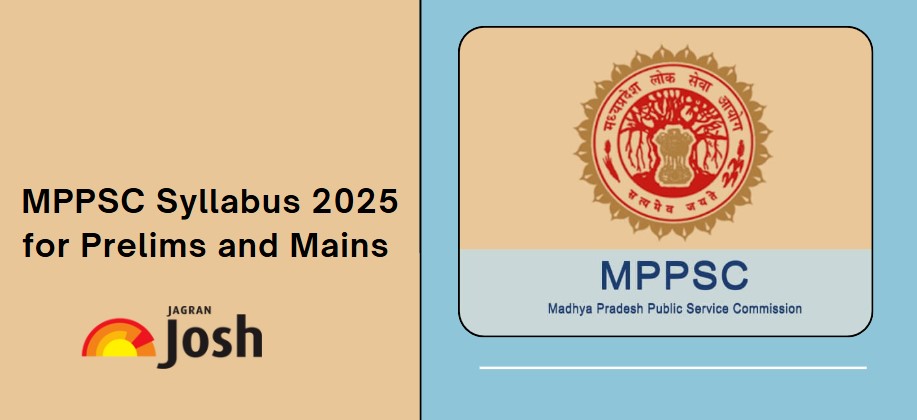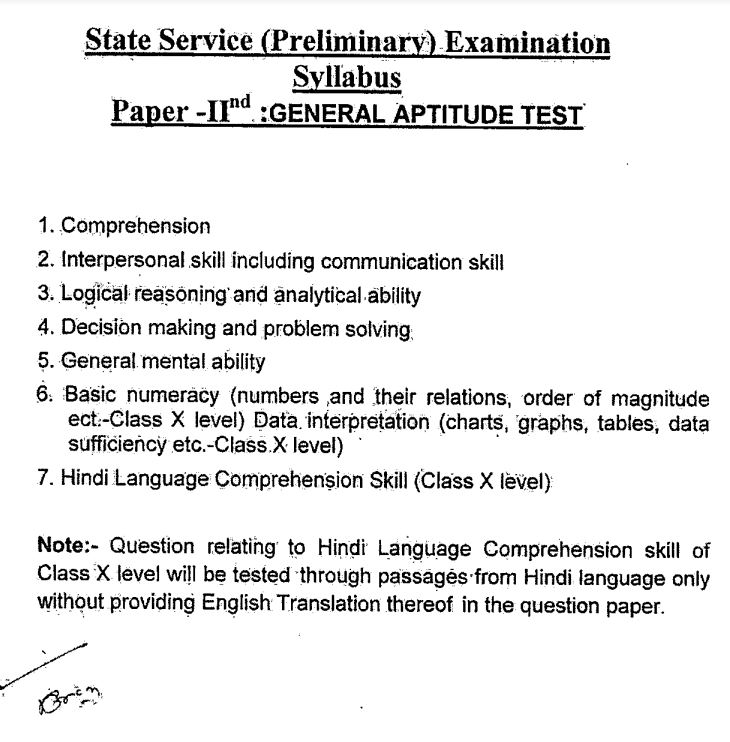
MPPSC Syllabus 2025 for Prelims & Mains, Download PDF

Madhya Pradesh Public Service Commission (MPPSC) has released the MPPSC Syllabus 2025 on its official website along with the notification. Candidates willing to crack the MPPSC exam should check the latest MPPSC syllabus before they begin their preparation. With the help of the Syllabus, candidates will be able to identify the topics that are important for the exam and prepare accordingly. The syllabus is divided into three stages, Prelims Mains and Interview. MPPSC aspirants can find complete details of MPPSC syllabus for Prelims and Mains exam and also download pdf.

MPPSC Syllabus 2025
MPPSC syllabus 2025 is segregated into Prelims and Mains exam. An interview is also held for the candidates who qualify the Mains exam. MPPSC Prelims syllabus is the first stage of the MPPSC selection process. It is an objective test consisting of General Studies and Aptitude Test for a total of 400 marks. The MPPSC Mains syllabus on the other hand is conventional in nature having 6 papers for a total of 1400 marks.
It is of prime importance for the MPPSC exam 2025 aspirants to go through the detailed syllabus that we have provided here. You can also download the official MPPSC syllabus PDF for Prelims and Mains exam through the link that has been provided here.
MPPSC Syllabus 2025 Overview
Have a look at the table to know the complete overview of the MPPSC Syllabus shared below.
| MPPSC Syllabus Particulars | Details |
| Conducting Body | Madhya Pradesh Public Service Commission (MPPSC) |
| Exam Name | MPPSC State Services Exam |
| Selection Stages | Prelims, Mains, and Interview |
| Number of Sections | Prelims: 2, Mains: 6 |
| MPPSC Prelims Subject | General Studies, General Aptitude Test |
| MPPSC Mains Subjects | General Studies-I, General Studies-II, General Studies-III, General Studies-IV, Hindi, Hindi Essay |
MPPSC Syllabus PDF for Prelims & Mains
Candidates can download MPPSC syllabus PDF for Prelims and Mains exam through the link that has been updated here. The following gives you the complete details with the list of important topics for each subject. You must ensure that you save the MPPSC syllabus PDF on your device so that you can access it at any time.
MPPSC Syllabus 2025 for Prelims Exam
MPPSC Prelims syllabus is the first stage of the MPPSC exam that every candidate must appear for. It is divided into parts, General Studies and General Aptitude Test. This paper is held to select the best candidates for the Mains exam. MPPSC syllabus for Prelims is designed in such a way that it acts as a solid foundation for the Mains exam. It is an objective test consists of the following subjects.
- General Science and Environment
- Current Events of National & International Importance
- History of India and Independent India
- Indian Polity and Economy
- Sports
- Geography. History and Culture of M.P.
- Polity and Economy of M.P
- Information and Communication Technology
MPPSC General Studies Syllabus
The important topics for the MPPSC Syllabus for General Studies has been provided below.
| MPPSC Syllabus 2025 Subjects | Topics |
| General Science and Environment | Basic Principles of Science. Health Policy and Programmes. Agricultural Product Technology. Food Processing. Ecological System. Nutrition, Food, and Nutrient. Important Indian Scientific Research Institutions and Their achievements, Satellite and Space technology. Environment and Biodiversity. Human Body. Pollution, Natural Disasters, and Management. |
| Constitution Government | Government India Act 1919 and 1935. Constituent Assembly. Financial Institutions- Reserve Bank of India, Nationalised Banks, Security and Exchange Board of India (SEBI), National Stock Exchange (NSE), Non-Banking Financial Institutions. Constitutional Amendments. Supreme Court and Judicial System. Union Executive, President, and Parliament. Fundamental Rights and Duties of the Citizens and Directive Principles of State policy. Indian Economy, Industrial Development and Foreign Trade, Import, and Export. |
| History of India & Independent India | Major events and Major dynasties in the history of Madhya Pradesh. Contribution of Madhya Pradesh to the freedom movement. Major features, Events, and administrative, Social, and Economical Systems of Ancient and Medieval India. Social and Religious Reform movements in the 19th and 20th centuries. Major festivals, Folk music, Folk arts, and Folk literature of Madhya Pradesh. Important Literator of Madhya Pradesh and their literature. Independence struggle and the Indian National Movement for Freedom. Major arts and Sculpture of Madhya Pradesh. Major Tribes and Dialects of Madhya Pradesh. Religious and tourist places of Madhya Pradesh. Important Tribal Personalities of Madhya Pradesh. Integration and Reorganization of India after Independence. |
| Geography of Madhya Pradesh | Forest, Forest Produce, Wildlife, Rivers, Mountains and Mountain ranges of Madhya Pradesh. Natural and Mineral resources of Madhya Pradesh. Transport in Madhya Pradesh. The climate of Madhya Pradesh. Major Irrigation and Electrical Projects in Madhya Pradesh. Agriculture, Animal husbandry, and Agriculture based industries in Madhya Pradesh. |
| Geography of World | Physical Geography: Physical features and Natural regions. Natural Resources: Forest, Mineral resources, Water, Agriculture, Wildlife, National Parks/ Sanctuaries/Safari. Natural Resources of World. Continents/Countries/Oceans/Rivers/Mountains of the world. Social Geography: Population-related Demography (Population growth, Age, Sex ratio, Literacy). Economic Geography: Natural and Human resources (Industry, Modes of Transport). Conventional and Non-conventional Energy Resources. |
| Current International & National Affairs | Important Personalities and Places. Important Sports Institutes, Sports Competitions, and Awards of India and Madhya Pradesh. Major Events. |
| Information & Communication Technology | Electronics, Information, and Communication Technology. Internet and Social Networking Sites. Robotics, Artificial Intelligence, and Cyber Security. E-Governance. E-commerce. |
| National and Regional Constitutional / Statutory Bodies | Election Commission of India. State Election Commission. Scheduled Castes and Scheduled Tribes Commission. Backward class Commission. Comptroller and Auditor General. NITI Aayog. Union Public Service Commission. Madhya Pradesh Public Service Commission. Human Rights Commission. Women Commission. Vigilance Commission. Child Protection Commission. Information Commission. National Green Tribunal. Food preservation Commission etc. |
MPPSC General Aptitude Test Syllabus
The 2nd paper for the MPPSC Prelims syllabus is the General Aptitude paper. Basic Mathematics questions, Reasoning questions, Hindi, etc will be a part of the MPPSC General Aptitude syllabus. It consists of the following topics.
- Comprehension
- General mental ability
- Logical reasoning and analytical ability
- Decision-making and problem-solving
- Interpersonal skills, including communication skill
- Basic numeracy (numbers and their relations, the order of magnitude, etc.-Class X level)
- Data interpretation (charts, graphs, tables, data sufficiency, etc.-Class X level)
- Hindi Language Comprehension Skill (Class X level)

MPPSC Mains Syllabus
MPPSC Mains syllabus is the second stage of the MPPSC exam. This is a conventional paper consisting of six papers in total. There are four General Studies papers and two Hindi papers. The details of the MPPSC Mains syllabus are as follows:
MPPSC Syllabus for General Studies 1
MPPSC General Studies syllabus for Paper 1 is the History and Geography paper. It shall have questions based on History & Culture World Histor, ndian History Moguls and their administration, Indian ‘Renaissance', Indian Culture, Geography Water Management, etc. Here is a list of all the important topics that are covered in the MPPSC GS 1 syllabus.
| MPPSC GS 1 Syllabus (History) | |
| Units | Topics |
| Unit-I | Political, Economic, Social and Cultural History of India from Harappan civilization to 10th Century A.D. |
| Unit-II | Political, Economic, Social and Cultural History of India from 11th to 18th Century A.D. Impact of British Rule on Indian Economy and Society. Mughal rulers and their administration, Emergence of composite culture. |
| Unit-III | Reactions of Indians against British Colonial Rule: Peasant and Tribal revolts, The First Struggle of Independence. Emergence of India as a Republic Nation, Reorganization of States, Formation of Madhya Pradesh. Major events of the post-independence period. Indian Renaissance: National Freedom Movement and its leaders. |
| Unit-IV | Independence Movement in Madhya Pradesh. Indian Cultural Heritage (with special reference to Madhya Pradesh) World Heritage sites in Madhya Pradesh and Tourism. Salient aspects of Art Forms, Literature, Festivals & Architecture from ancient to modern times. |
| Unit-V | Gondwana, Bundeli, Bagheli, Holkar, Scindia and Bhopal State (From the beginning till independence). |
| MPPSC GS 1 Syllabus (Geography) | |
| Unit-I | Major Physical Features: Mountains, Plateaus, Plains, Rivers, Lakes and Glaciers. World Climate: Climate and seasons, distribution of rainfall and climatic regions, Climate change and its effects. Major Geographical Phenomena: Earthquakes, Tsunami, Volcanicity, Cyclone. |
| Unit-II |
|
| Unit-III |
|
| Unit-IV |
|
| Unit-V |
|
MPPSC Syllabus for General Studies 2
MPPSC Syllabus for General Studies 2 is the Polity, Economics, and Sociology paper. It is divided into two parts. The 1st part is the Constitution, Governance, Political, and Administrative Structure paper while the second part is the Economics and Sociology. Here are the details of the MPPSC GS 2 syllabus for Mains.
Part A- Constitution, Governance, Political, and Administrative Structure
| Units | Topics |
| Unit 1. | Constitution of India Conceptual Elements Federalism in India Center-State Relations Judiciary in India |
| Unit 2. | Constitutional Bodies Politics in India Civil society, and Public movement, National integrity, and security issues |
| Unit 3. | Public participation and local government (with reference of 73rd and 74th amendment to the Constitution) Accountability and Rights Community-based organizations (CBO)- Non-Government Organizations (NGOs), and Self-help groups (SHG). Role of Media and Problems (Electronic, Print, and Social) |
| Unit 4. | Indian Political Thinkers |
| Unit 5. | Administration and Management Concepts Theories of organization, steps, and area of control and unity of command. New dimensions of public management, management of change, and development administration. |
Part B- Economics and Sociology
| Units | Topics |
| Unit 1. Economy of India | Sectors of Economy- Issues and initiatives in the field of agriculture, industry, and services sector in India. Measurement of national income in India. Taxation system in India Fiscal policy of India Public Distribution System, Current Trends and Challenges of the Indian economy External Sector International Organizations and their Headquarters |
| Unit 2. Economy of Madhya Pradesh |
|
| Unit 3. Human Resource Development | Education Vulnerable Section of Society- Issues and Welfare Programs |
| Unit 4. |
|
| Unit 5. | Population and Associated Issues Schedules Tribes Nutrition and Health World Health Organization:- Objectives, Structure, Functions, and Programmes. |
MPPSC General Studies 3 Syllabus
MPPSC General Studies Syllabus for Paper 3 consists of Science and Technology. Questions based on class 10th science, latest inventions, discoveries, etc will be part of this paper. Here is a list of all the important topics covered in it.
| Units | Topics |
| Unit 1. Physics | Work, Power, and Energy- Gravitational Force, Friction, Atmospheric Pressure, and Work. Units and Measurement, Examples from daily life. Speed, Velocity, Acceleration Sound- Definition, Medium of Propagation, Audible and Inaudible sound, Noise, and Music. Terminology related to Sound:- Amplitude, Wave Length, Frequency of Vibration. Electricity:- Different types of cells, Circuit. Magnet:- Properties, preparation, and uses of artificial magnet Light:- Reflection, Refraction, Mirrors and Lenses, Image Formation, Heat: Measuring Temperature, Thermometers, Transformation of Heat. |
| Unit 2. Chemistry | Element, Compound, and Mixture- Definition, Chemical Symbols, Properties, Availability on the Earth, Material:- Metals and Non-Metals, Periodic Table and Periodicity. Atom, Atomic Structure, Valancy, Bonding, Nuclear Fusion, and Fission. Acids, Bases, and Salts. PH Value Indicators. Physical and Chemical Changes. Chemistry in daily life |
| Unit 3. Biology | Micro-organism and Organic Farming. Cell –Structure and Function, Classification of Animals and Plants. Nutrition in plants, animals, and human beings, Balanced Diet, Vitamins, Deficiency Diseases, Hormones, Body Organs of Human Beings, Structure, and Functioning. Respiration in Organisms. Transportation in Animals and Plants. Reproduction in Animals and Plants Health and Hygiene and Diseases. |
| Unit 4. Computer and Digital Governance | Types, Characteristics, and Generations of Computers Memory, Storage Devices Input and Output Devices Software and Hardware Operating systems, Windows Uses of Microsoft Office Computer Languages- Translators, Compilers, Interpreters and Assemblers. Internet, E-mail, Social Media E-Governance. Different useful Portals, Sites, and Web Pages. |
| Unit 5. General Maths & Statistics | General Maths Statistics |
| Unit 6. Health | Communicable diseases and their Prevention. National Vaccination Programme. Primary Knowledge of AYUSH- Ayurveda, Yoga, Unani, Siddha, Homeopathy Health Related Important Welfare Schemes of Central and State Government. Major Health Organizations of Central and the State Government. |
| Unit 7. Technology | Effects of Development on Human Life, Limitations of Indigenous Technologies. History of Remote Sensing, Remote Sensing in India. Scientific Institutes (General information of above institutions) Generations of Geostationary Satellite Launch Vehicles. Biotechnology- Definition, and uses of Biotechnology in sectors of Health and Medicine, Agriculture, Animal Husbandry, Industry, and Environment. Clones, Robots, and Artificial Intelligence. Patents and Rights of Intellectual Property (Trips, Trims) Contribution of Indians in the field of Science and Technology National and International Awards in the field of Science. |
| Unit 8. Energy |
Energy Efficiency Energy Management Organizational Integration, Energy Management in Operational Functions, Energy Purchase, Production, Production planning and Control, Maintenance. Issues and Challenges related to Energy Strategies Alternate Sources of Energy- Present scenario and future possibilities. Solar Energy, Wind Energy, Oceanic Energy, Geothermal Energy, Biomass Energy, Biofuel Energy, etc. |
| Unit 9. Environment | Environment, Pollution and its types, its impact on the environment, Environment Conservation and Biodiversity |
| Unit 10. Geology | Definition and importance of Geology, Rocks and its types, Minerals and Ores, Fossils, Natural Coal, Natural Oil, and Natural Gas, Weathering and Erosion, Formation of soil |
General Studies IV
MPPSC General Studies 4 syllabus consists of philosophy, psychology and public administration. The important topics covered in it are as follows:
| Units | Topics |
| Unit-I | Philosophers/Thinkers, Social Reformers: Philosophers/Thinkers, Social Reformers: Socrates, Plato, Aristotle, Acharya Shankar, Mahavir, Buddha, Raja Ram Mohan Roy, Savitribai Phule, Swami Dayanand Saraswati, Charwak, GuruNanak, Kabir, Tulsidas, Ravindra Nath Tagore, Swami Vivekanand, Maharshi Arvind and Sarvpalli Radhakrishnan. |
| Unit-II | Attitude: Content, Elements, Persuasive Communication, Prejudice and Discrimination, Function Formation of Attitude, Attitudinal Change, Stereotypes Orthodox in the Indian context. Aptitude: Aptitude and foundational values for Civil Service, Integrity, Empathy, Impartiality and Non-partisanship, Objectivity, Dedication to public service, Tolerance, and Compassion towards the weaker sections. Emotional Intelligence: Emotional Intelligence-Concepts, their utilities and application in Administration and Governance. Individual differences. |
| Unit-III | Ethics and Values in Public Administration: Ethical elements in governance-Integrity, Accountability and Transparency, Ethical Reasoning and Moral Dilemmas, Conscience as a source of ethical guidance. Code of Conduct for Civil Servants, Implementation of Higher values in governance. |
| Unit-IV | Corruption: Types and Causes of Corruption, Effects of corruption, Media, Approaches to minimizing corruption, Role of society, Family and Whistleblower, United Nation Convention on Corruption, Transparency International, Measuring corruption, Lokpal and Lokayukta. |
| Unit-V | Case Studies: Based on the contents of the syllabus. |
MPPSC Syllabus Weightage Subject Wise
The subject wise weightage of MPPSC syllabus for Prelims, Mains and Interview is as follows:
| Stages of MPPSC Exam | Subjects | Marks |
| MPPSC Prelims | General Studies-Objective (2 Hours) | 200 |
| General Aptitude Test- Objective (2 Hours) | 200 | |
| MPPSC Mains | General Studies-I (3 hours) | 300 |
| General Studies-II (3 hours) | 300 | |
| General Studies-III (3 hours) | 300 | |
| General Studies-IV (3 hours) | 200 | |
| Hindi (3 Hours) | 200 | |
| Hindi Essay (2 hours) | 100 | |
| MPPSC Interview | Personality Test | 175 |
You can also apply for other Government Jobs
Trending
Other Exams
Latest Education News
- 29 mins ago
- 29 mins ago